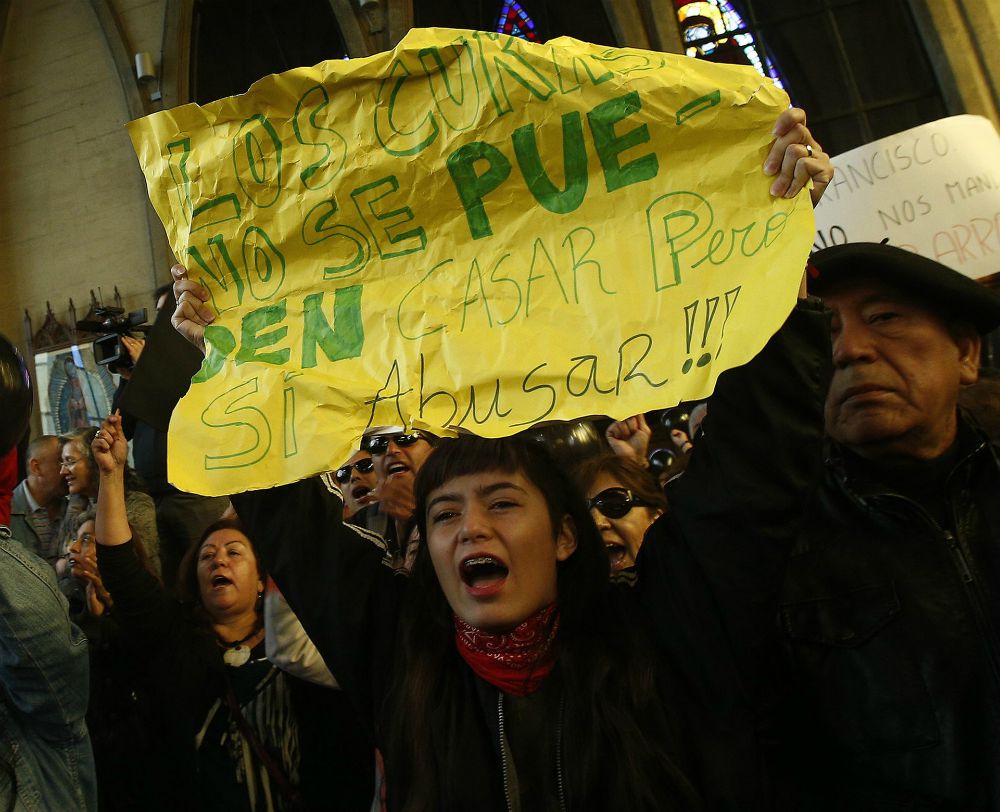
Demonstrators in Chile protest against Bishop Juan Barros inside the Cathedral of St. Matthew in Osorno, Chile, March 21, 2015. (CNS/EPA/Felipe Trueba)
The Maltese archbishop has been sent on a mission that could make or break the legacy of the pope. Archbishop Charles Scicluna bears the heavy burden of deciding whether the pope correctly proclaimed a Chilean bishop innocent of covering up a convicted priest's sex abuses or obstructed justice by shunning evidence of the bishop's guilt.
What pope other than Francis could we imagine assigning his own special prosecutor to investigate his own words and actions? Accordingly, it wouldn't be so surprising if Francis' innovative and humble character accepted a censorious verdict and abjectly apologized for his errors. But that possibility lies ahead. For the moment, Francis is at the center of a controversy that raises strange and intriguing questions. The deck has been scrambled.
Francis has evoked enormous adulation on the strength of his reputation for honesty and openness. His authority stems from those qualities embodied in a gregarious, self-effacing style that preaches mercy. It rests on the integrity of his word. If it is shown to have been compromised in a major case involving clergy sex abuse, the most destructive scandal in centuries for the church, the foundation of Francis' papacy could crumble.
Friction first emerged as the pope visited Chile in January and was petitioned by those who accuse Bishop Juan Barros of keeping silent about sex abuse crimes committed by Fr. Fernando Karadima, who was found guilty both by Chilean courts and the Vatican. The pope took umbrage at the claim by victims of Karadima that they could prove Barros had shielded the priest. He verbally swatted away their pleas to meet with him, calling their charges "slander" and "calumny," declaring stridently that he had found the bishop blameless.
Case closed? Not as it turned out. On the flight back to Rome, Francis allowed that his categorical denial of any wrongdoing by the bishops' might have offended victims of Karadima, though he virtually denied any damaging evidence existed. In effect, he put his reputation on the line by implying that he had arrived at an incontrovertible conclusion. With impassioned victims shouting objections to being left out of the investigation and vowing to produce proof if given the opportunity, Francis, a notable "man of the people," left doubts behind. The kind of doubts that can come back to haunt, big time.
Now all of a sudden, Scicluna is dispatched to uncover something. Were creditable witnesses against Barros ready to go public, threatening to undermine the pope's firm judgment? Did the pope have a crisis of conscience, aware that he might have succumbed to the human temptation to do favors for friends and associates? A string of such cover-ups had wreaked havoc at the highest levels of the church. When Benedict XVI suddenly vacated the papacy five years ago, his growing despondency over handling such scandals was widely believed to be a major cause. He turned over a papacy still in the throes of the huge crisis.
Advertisement
Francis' appeal was largely that he had the fullness of character and tactical skills to tackle the threats and place the church on a more even keel, even as he projected a message of hope and joy. It's Catholicism's tallest order and, left unfixed, can continue to empty pews and raise suspicions. At this point, his ardent supporters haven't seen much progress but are alert to incidents which indicate his intentions. The anguish in Chile has provided that. Its implications have been magnified by the delay and the unsettling behavior of a pope who has never before lashed out at ordinary Catholics with grievances over which he has some control.
As others have said, the Maltese archbishop is in a dicey spot. If he turns in strong testimony that implicates Barros, it can weaken the pope's credibility and portray him as a pope just as prone to protect clergy as other high-ranking church officials have been. If the archbishop exonerates Barros, Francis can gain stature as a pope who stands by innocent people without counting the cost. Barros' accusers stand on highly visible, precedent-setting ground. If their word and witness is admitted, it could offer promise to lay people who feel demeaned by the clerical class. If valid evidence is ignored, however, it will almost surely be seen as clericalism as usual.
The archbishop's rigorous venture is an awkward trial of its own, the pope having been pressured to be second guessed and the Vatican's special council poised between speaking truth and pleasing the boss. Everyone stands to gain or lose something significant. For the pope, trust hangs in the balance.







